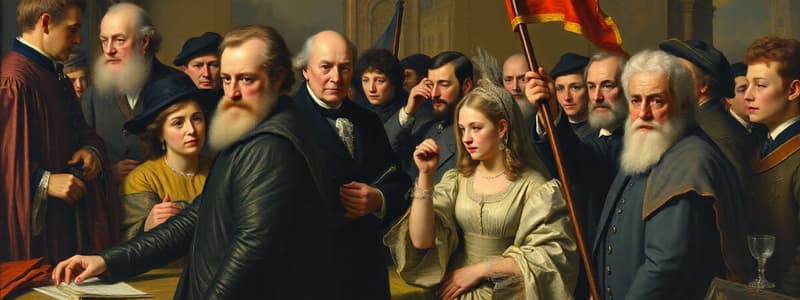Podcast
Questions and Answers
Match the following SPICE themes with their corresponding concepts:
Match the following SPICE themes with their corresponding concepts:
Political = Nationalism, revolutions, and wars Social = Family and kinship, gender roles, and hierarchies Cultural = Arts & Architecture, religion, writing & literature Economic = Labor systems, trade, and currency Interaction with the Environment = Migration, disease, and climate change
Match the following terms with their definitions:
Match the following terms with their definitions:
Capitalism = An economic and political system in which a country's trade and industry are controlled by private owners for profit. Socialism = An economic system in which major industries are owned by workers rather than by private businesses. Communism = A political theory derived from Karl Marx, advocating class war and leading to a society in which all property is publicly owned and each person works and is paid according to their abilities and needs. Urbanization = A population shift from rural to urban areas. Nationalism = The idea of a distinct national identity, often based on shared language, history, culture, or ethnicity. Union = An organization formed by workers who join together and use their strength to have a voice in their workplace. Social Contract = Describes an agreement between a group of people and their government, in which a society's moral and political rules of behavior are established.
The ______ Revolution was a significant anti-slavery uprising that took place in 1791.
The ______ Revolution was a significant anti-slavery uprising that took place in 1791.
Haitian
The Grand Blancs, Wealthy Free People of Color, Petit Blancs, Mulattos, and Enslaved Africans, are an example of a ______ in ______. (country)
The Grand Blancs, Wealthy Free People of Color, Petit Blancs, Mulattos, and Enslaved Africans, are an example of a ______ in ______. (country)
The French Revolution profoundly impacted French culture by promoting ideals of:
The French Revolution profoundly impacted French culture by promoting ideals of:
Which of the following is a cultural change brought about by the French Revolution?
Which of the following is a cultural change brought about by the French Revolution?
Which of the following is a social impact of urbanization during the Industrial Revolution?
Which of the following is a social impact of urbanization during the Industrial Revolution?
The French Revolution's impact on global politics was most directly reflected in the:
The French Revolution's impact on global politics was most directly reflected in the:
What was a major consequence of the Industrial Revolution on global trade?
What was a major consequence of the Industrial Revolution on global trade?
Describe how the anthem "La Marseilles" shows examples of nationalism. Provide specific lines that show one positive and one negative aspect of nationalism.
Describe how the anthem "La Marseilles" shows examples of nationalism. Provide specific lines that show one positive and one negative aspect of nationalism.
What evidence does the "Livre Rouge" provide to tell us about the economic causes of the French Revolution?
What evidence does the "Livre Rouge" provide to tell us about the economic causes of the French Revolution?
According to the "Law of Suspects", describe three ways in which someone might be considered an enemy of liberty.
According to the "Law of Suspects", describe three ways in which someone might be considered an enemy of liberty.
How does the language and symbolism in the Haitian Declaration of Independence reflect the trauma of slavery and colonial rule?
How does the language and symbolism in the Haitian Declaration of Independence reflect the trauma of slavery and colonial rule?
What is the purpose of government according to John Locke?
What is the purpose of government according to John Locke?
How does a leader gain and then maintain power, according to John Locke?
How does a leader gain and then maintain power, according to John Locke?
How does Locke's challenge traditional ideas about government and authority?
How does Locke's challenge traditional ideas about government and authority?
What does this political cartoon tell us about Great Britain's reasons for going to war with Napoleon?
What does this political cartoon tell us about Great Britain's reasons for going to war with Napoleon?
How did the invention of the cotton gin affect the slave trade in the United States?
How did the invention of the cotton gin affect the slave trade in the United States?
In what ways did enslaved Africans resist their oppression during the Atlantic Slave Trade?
In what ways did enslaved Africans resist their oppression during the Atlantic Slave Trade?
How was ethnic nationalism a threat to the Ottoman and Habsburg Empires?
How was ethnic nationalism a threat to the Ottoman and Habsburg Empires?
How did the technological development of the steam engine contribute to the rise of the Industrial Revolution?
How did the technological development of the steam engine contribute to the rise of the Industrial Revolution?
How did gender roles change during the industrial revolution? What about them stayed the same?
How did gender roles change during the industrial revolution? What about them stayed the same?
Flashcards
What is Capitalism?
What is Capitalism?
An economic and political system in which a country's trade and industry are controlled by private owners for profit.
What is Urbanization?
What is Urbanization?
A population shift from rural to urban areas.
What is Nationalism?
What is Nationalism?
The idea of a distinct national identity, often based on shared language, history, culture, or ethnicity.
What is Divine Right?
What is Divine Right?
Signup and view all the flashcards
What is Laissez-Faire?
What is Laissez-Faire?
Signup and view all the flashcards
What is the Enlightenment?
What is the Enlightenment?
Signup and view all the flashcards
Who was Napoleon Bonaparte?
Who was Napoleon Bonaparte?
Signup and view all the flashcards
Who was Toussaint Louverture?
Who was Toussaint Louverture?
Signup and view all the flashcards
What was the Haitian Revolution?
What was the Haitian Revolution?
Signup and view all the flashcards
Who was Otto von Bismarck?
Who was Otto von Bismarck?
Signup and view all the flashcards
What is Communism?
What is Communism?
Signup and view all the flashcards
What is Socialism?
What is Socialism?
Signup and view all the flashcards
What is a Union?
What is a Union?
Signup and view all the flashcards
What is a Social Contract?
What is a Social Contract?
Signup and view all the flashcards
What was the independence of Latin America?
What was the independence of Latin America?
Signup and view all the flashcards
What was the Industrial Revolution?
What was the Industrial Revolution?
Signup and view all the flashcards
What are some examples of governments during the French Revolution?
What are some examples of governments during the French Revolution?
Signup and view all the flashcards
What was the hierarchy in Haiti?
What was the hierarchy in Haiti?
Signup and view all the flashcards
What are the ideals of the French Revolution?
What are the ideals of the French Revolution?
Signup and view all the flashcards
How did the French Revolution change culture?
How did the French Revolution change culture?
Signup and view all the flashcards
What is a social impact of urbanization during the Industrial Revolution?
What is a social impact of urbanization during the Industrial Revolution?
Signup and view all the flashcards
What was the French Revolution's impact on global politics?
What was the French Revolution's impact on global politics?
Signup and view all the flashcards
What was a major consequence of the Industrial Revolution on global trade?
What was a major consequence of the Industrial Revolution on global trade?
Signup and view all the flashcards
How does 'La Marseilles' show examples of Nationalism?
How does 'La Marseilles' show examples of Nationalism?
Signup and view all the flashcards
What evidence does the 'Livre Rouge' provide about the economic causes of the French Revolution?
What evidence does the 'Livre Rouge' provide about the economic causes of the French Revolution?
Signup and view all the flashcards
What does the 'Law of Suspects' tell us about the criteria for being an enemy of liberty?
What does the 'Law of Suspects' tell us about the criteria for being an enemy of liberty?
Signup and view all the flashcards
How does the Haitian Declaration of Independence reflect the trauma of slavery?
How does the Haitian Declaration of Independence reflect the trauma of slavery?
Signup and view all the flashcards
According to John Locke, what is the purpose of government?
According to John Locke, what is the purpose of government?
Signup and view all the flashcards
According to Locke, how does a leader gain and maintain power?
According to Locke, how does a leader gain and maintain power?
Signup and view all the flashcards
How does Locke's theory challenge traditional ideas about government?
How does Locke's theory challenge traditional ideas about government?
Signup and view all the flashcards
What does this cartoon tell us about why Britain is going to war with Napoleon?
What does this cartoon tell us about why Britain is going to war with Napoleon?
Signup and view all the flashcards
How did the invention the cotton gin affect the U.S. slave trade?
How did the invention the cotton gin affect the U.S. slave trade?
Signup and view all the flashcards
How did enslaved Africans resist their oppression?
How did enslaved Africans resist their oppression?
Signup and view all the flashcards
How was ethnic nationalism a threat to the Ottoman and Habsburg empires?
How was ethnic nationalism a threat to the Ottoman and Habsburg empires?
Signup and view all the flashcards
How did the steam engine contribute to the rise of the Industrial Revolution?
How did the steam engine contribute to the rise of the Industrial Revolution?
Signup and view all the flashcards
How did gender roles change during the Industrial Revolution?
How did gender roles change during the Industrial Revolution?
Signup and view all the flashcards
Study Notes
Matching Themes
- Matching themes for history study are:
- Political (B)
- Social (A)
- Cultural (3)
- Economic (4)
- Interactions with the Environment (5)
Matching Definitions
- Capitalism (6): An economic system where major industries are privately owned for profit. (F)
- Socialism (7): An economic system where major industries are owned by workers. (B)
- Communism (8): A political theory advocating class war leading to a society with all property publicly owned based on people's needs (G)
- Urbanization (9): A population shift from rural to urban areas. (A)
- Nationalism (10): A distinct national identity based on shared culture, language, history, and ethnicity. (C)
- Union (11): An organization formed by workers to gain a voice in the workplace. (E)
- Social Contract (12): An agreement between a group of people and their government about moral and political rules for behaviour.(D)
Fill in the Blank
- Haitian Revolution (13): A significant anti-slavery uprising in 1791.
- Napoleon Bonaparte (14): A French military leader who rose to power after the French Revolution in 1799.
- Industrial Revolution (15): Began in Great Britain, leading to factories and urbanization.
- Spanish Colonial Rule (16): Latin American countries gained independence from this rule in the 19th century.
- French Revolution Governments (17): The National Assembly, Legislative Assembly, National Convention, and The Directory.
- Otto von Bismarck (18): United Germany in 1871.
Additional Fill in the Blanks
- Divine Right (19): The political and religious belief that monarchs were chosen by God.
- Laissez-faire (20): An economic theory emphasizing minimal government interference in the Free markets.
- Enlightenment (21): An intellectual movement that fueled anti-slavery sentiments by emphasizing individual rights and equality.
- Toussaint Louverture (22): A prominent Haitian general and leader in the Haitian Revolution
Multiple Choice
- Social Hierarchy (23): The Grand Blancs, Wealthy Free People of Color, Petit Blancs, Mulattos, and Enslaved Africans are an example of this in Haiti.
- French Revolution Ideals (24): Life, liberty, and fraternity.
- Cultural Change (25): The rise of the Cult of the Supreme Being, which tried to replace Catholicism in the French Revolution.
- Urbanization Impact (26): The rise of the middle class during the Industrial Revolution was a social impact of urbanization.
- French Revolution's Global Impact (27): The spread of Democratic ideals was the most direct reflection of the French Revolution on global politics.
- Industrial Revolution Impact (28): Increased demand for raw materials was a major consequence of the Industrial Revolution on global trade.
Document & Image Analysis
- Nationalism in La Marseillaise (29): Children of the Fatherland implies a paternalistic nationalism where citizens are beholden to a family-like nation; 'Let impure blood water our furrows' is a negative reflection on people not part of that nation and can lead to discrimination.
Document Analysis (Livre Rouge)
- Economic Causes of the French Revolution (30): The Livre Rouge, a financial record, reveals high levels of spending by the King and Queen(11,423,750 livres) contrasting with the common people's lower incomes, highlighting a significant economic disparity.
Document Analysis (Law of Suspects)
- Enemies of Liberty (31): Associating with enemies of liberty, failing to fulfill citizen duties, inability to justify one's means of existence, refusal of patriotism certificates, being a former noble or emigre were reasons for being considered enemies of liberty.
Document Analysis (Haitian Declaration)
- Trauma of Slavery (32): The Declaration's language reflects the trauma of slavery in several ways. France is explicitly called 'barbarians' and an inhuman government which mirrors the views of enslavers towards enslaved people. This emphasizes the hypocrisy of a nation claiming ideals of freedom while perpetuating slavery.
Document Analysis (Two Treatises of Government)
- Government's Purpose (33): To protect natural rights (life, liberty, property) constantly under attack by others.
- Leader's Power (34): A leader gains power through the consent of the governed and maintains it by preserving those rights.
- Challenges to Traditional Authority (35): Locke challenged the idea of divine right by asserting that people consent to be governed.
Written Response
- Cotton Gin and Slave Trade (36): The cotton gin increased the need for enslaved workers as it increased cotton production, motivating plantation owners to purchase more to profit.
- Enslaved African Resistance (37): Enslaved Africans resisted oppression through various methods, including running away, sabotaging work, and poisoning.
- Ethnic Nationalism as a Threat (38): Ethnic nationalism threatened the Ottoman and Habsburg Empires due to the diverse ethnic populations in their territories, creating desire for separate nations
- Steam Engine and Industrial Revolution (39): The steam engine enabled greater access to coal, stimulating industrialization and technological advancements.
- Gender Roles During Industrial Revolution (40): Lower-class women's roles changed from farm/home to factory work, while middle-class women's roles largely remained in the home.
Studying That Suits You
Use AI to generate personalized quizzes and flashcards to suit your learning preferences.
Related Documents
Description
Test your knowledge on various political and economic ideologies including capitalism, socialism, and communism. This quiz also explores societal themes like urbanization and nationalism. Perfect for history students looking to deepen their understanding of how these concepts are interconnected.




